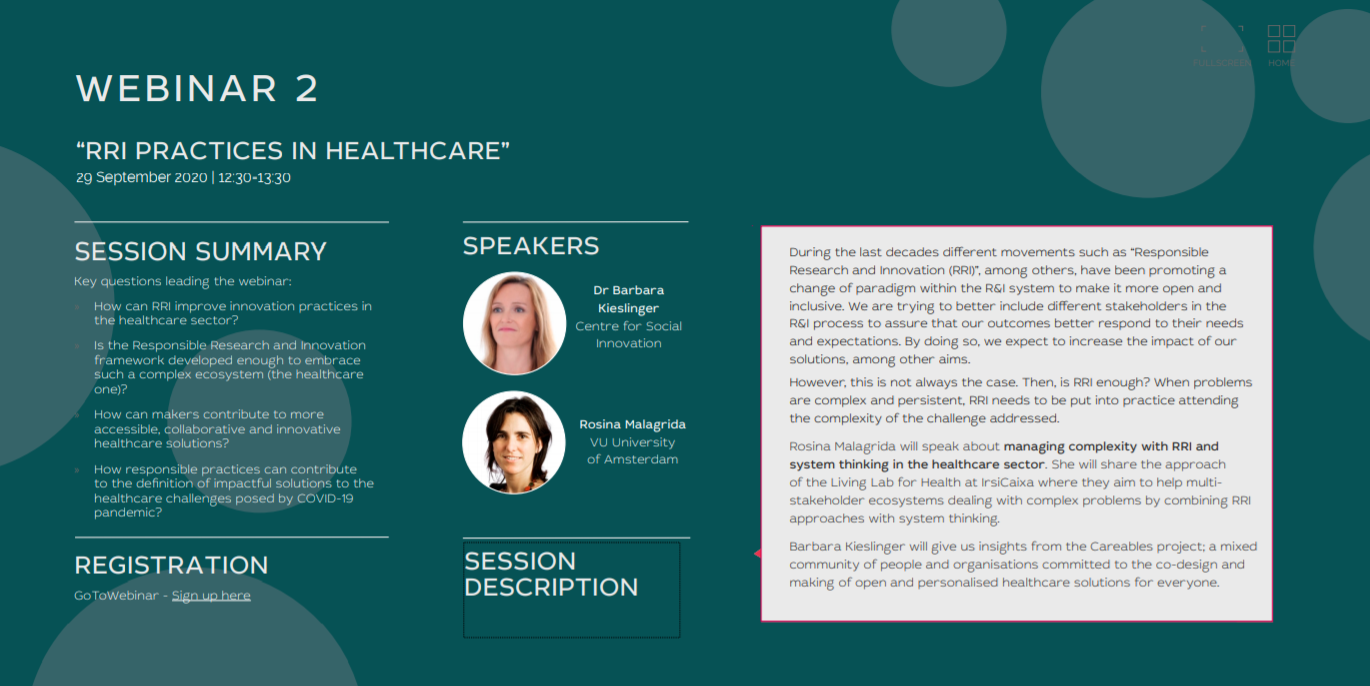Is the RRI framework advanced enough to manage the complexity of healthcare innovation ecosystems?
This question kick started the second episode of CHERRIES webinar series “Exploring Responsible Healthcare Ecosystems”. Held on September 29, this session focussed on RRI practices in healthcare and saw two experts on our “virtual stage”: Rosina Malagrida, Head of the Living Lab for Health at IrsiCaixa & Co-coordinator of the Barcelona “la Caixa” Living Lab, and Barbara Kieslinger, Coordinator of Careables.org and Project Manager at the Centre for Social Innovation – ZSI, Vienna, Austria.
Two totally different approaches were presented during the webinar.
Rosina Malagrida spoke about the complexity that characterizes the healthcare sector and the need for a new problem solving approach where different stakeholders of the ecosystem are involved throughout the whole innovation chain, from challenge definition to solution implementation. In this context, RRI can help regional actors to act at ecosystemic level, rather than project level to generate a real impact with and for society, moving from an organisational perspective to a community one.
Rosina presented how linear thinking is not enough to embrace such a complexity, while systemic thinking can help identifying root causes and mapping interconnections. She also elaborated on the role intermediaries should play in establishing a dialogue between society and the R&I community.
Download here Rosina Malagrida’s presentation: 01_RRI_Cherries_Webinar_Sept2020_Malagrida
Barbara Kieslinger presented the Careables.org platform, a mixed community of people and organisations committed to the co-design and making of open, personalised healthcare for everyone, born from the EU-funded collaborative H2020 project Made4You.
She presented how Careabes.org embedded key dimensions of the RRI framework in its methodology and practices, and the result is a set of “responsible making principles”:
- Make things that make sense: Create solutions that answer to real personal problems or needs.
- Co-design with others: Make space for diverse skills, competences, knowledge, and experiences to merge and come to new and meaningful solutions.
- Empower people: Teach others so that everyone can become more technologically literate and see the potentials.
- Share How You Make: Openly document the making of the project enabling its replication and choose the most appropriate licenses for your project.
- Be aware of limits: Consider any gaps of knowledge when you design for health and care, ask the people you design for and clinicians for support and feedback and follow quality and safety standards.
Barbara then elaborated on the legal and ethical aspects that influence the work makers do when developing healthcare and medical solutions/devices.
Download here Barbara Kieslinger’s presentation: 02_Cherries_Webinar_Sept2020_Kieslinger
This is in a nutshell what was discussed during the 2nd episode of CHERRIES webinar series “Exploring Responsible Healthcare Ecosystems”.
You can watch the full episode here
If you want to know more about CHERRIES and our webinar series download this presentation: Cherries_eu_webinar series_EP2
Next Episode is on October 6th at 14.30 CET, don’t miss it!
Episode 3. The role of procurement in healthcare innovation
With Dr. John Rigby (University of Manchester | Bibliometrica Ltd.) and Samuli Kauppinen (Oulu University Hospital)
